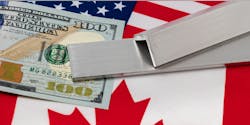US Revises Canadian Aluminum Tariffs: Will Only Impose Duties if Import Limits Exceeded
Hours before Canada was expected to make an official statement sanctioning the U.S. for its aluminum tariffs, the United States Trade Representative announced it would revise the aluminum tariff policy it announced in August that charged 10% duties on all aluminum products imported from Canada.
Going forward, the U.S. will only charge 10% tariffs if monthly aluminum imports spike unexpectedly. In a press conference, Deputy Prime Minister of Canada Chrystia Freeland confirmed that Canada would back down on its own plans to impose “dollar-for-dollar” trade countermeasures in light of the USTR’s decision.
According to a USTR statement, the tariff revision came after consultations with the Canadian government indicating that trade in non-alloyed, unwrought aluminum is likely to stabilize in late 2020.
After those discussions, the United States said it would resume duty-free treatment of affected shipments, retrospective to September 1, provided imports stay within below monthly “expected values” of 83,000 tons in September and November and below 70,000 tons in December.
If shipments for a given month exceed 105% of the “expected values”—for example, if Canada exports more than 73,500 tons of aluminum to the U.S. in September—the United States will retroactively impose a 10% tariff on all shipments made for the relevant month and consider re-imposing the August 10% tariff.
Deputy Prime Minister of Canada and Minister of Finance Chrystia Freeland said Canada would not impose its own tariffs on the United States and welcomed the decision to drop the duties, which she called “unacceptable.”
“Canada is not a threat to U.S. national security,” she said at a press conference Tuesday. “Aluminum trade between Canada and the U.S. has long been mutually beneficial for both our countries, and tariffs would have harmed workers and industry on both sides of the border, disrupting linked supply chains that have made North American aluminum more competitive around the world.”
She did warn, however, that Canada remained “prepared” to reimpose the counter-tariffs if the U.S. reneged and imposed tariffs anyway, and said that the U.S.’s decision was not a negotiated agreement.
The Canadian and U.S. Chambers of Commerce both cheered the decision to drop the tariffs. “What American manufacturers need now is certainty that these tariffs won’t make another reappearance,” said U.S. Chamber of Commerce Head of International Affairs Myron Brilliant.
The Senior Director of International Trade at the Canadian Chamber of Commerce, Mark Agnew, also welcomed the lifting of tariffs but said the actions of the United States were a unilateral and unjustified attempt to change market forces.
“The United States has not unconditionally lifted its tariffs on Canadian aluminum and continues to seek to restrict market-driven trade flows,” said Agnew. “We call on the United States to fully and without precondition remove the threat that tariffs could be re-imposed in the future.” He went on to say that removing the threat of tariffs would provide certainty for Canadian and American businesses.
The United States Trade Representative said it would consult with the Canadian government at the end of 2020 to review expected aluminum market conditions for the first four months of 2021.
About the Author
Ryan Secard
Associate Editor
Ryan Secard joined Endeavor B2B in 2020 as a news editor for IndustryWeek. He currently contributes to IW, American Machinist, Foundry Management & Technology, and Plant Services on breaking manufacturing news, new products, plant openings and closures, and labor issues in manufacturing.
